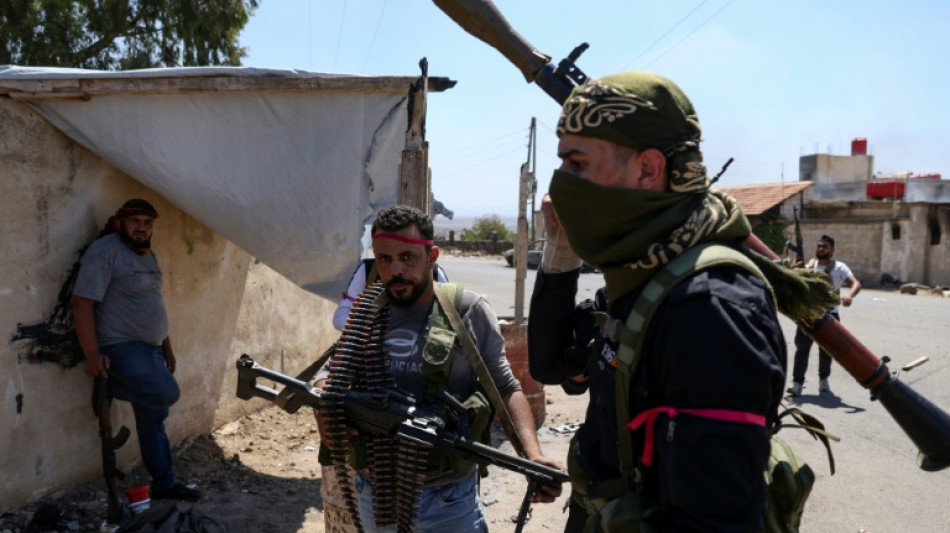

US announces Syria-Israel truce as new clashes rock Druze heartland
The United States said early Saturday that it had negotiated a ceasefire between Israel and Syria's government as new clashes erupted in Syria's Druze heartland following violence that prompted massive Israeli strikes.
At least 638 people have died since Sunday in violence between the Druze and Bedouins, according to the Syrian Observatory for Human Rights, drawing questions over the authority of Syria's interim leader Ahmed al-Sharaa.
Israel intervened Wednesday with major strikes in the heart of the capital Damascus, including hitting the army's headquarters.
Tom Barrack, the US pointman on Syria, said in the early hours of Saturday in the Middle East that Sharaa and Israeli Prime Minister Benjamin Netanyahu "have agreed to a ceasefire" negotiated by the United States.
Barrack, who is US ambassador to Ankara, said the deal was backed by Turkey, a key supporter of Sharaa, as well as neighbouring Jordan.
"We call upon Druze, Bedouins and Sunnis to put down their weapons and together with other minorities build a new and united Syrian identity in peace and prosperity with its neighbours," he wrote on X.
The United States on Wednesday announced an earlier deal in which Sharaa pulled government forces out of Sweida, the southern hub of the Druze minority.
Sharaa said the mediation helped avert a "large-scale escalation" with Israel but his office accused Druze fighters of violating it.
Sharaa's office on Friday evening pledged to deploy fresh forces to the region to break up further clashes in the south, urging "all parties to exercise restraint and prioritise reason".
Renewed fighting erupted Friday between Bedouin tribal factions and the Druze at the entrance to Sweida, an AFP correspondent said.
About 200 tribal fighters clashed with armed Druze men from the city using machine guns and shells, the AFP correspondent said, while the Syrian Observatory also reported fighting and shelling on neighbourhoods in Sweida.
In the corridors of the Sweida National Hospital, a foul odour emanated from the swollen and disfigured bodies piled up in refrigerated storage units, an AFP correspondent reported.
A small number of doctors and nurses at the hospital worked to treat the wounded arriving from the ongoing clashes, some in the hallways.
Omar Obeid, a doctor at the government hospital, told AFP that the facility has received "more than 400 bodies" since Monday morning.
"There is no more room in the morgue. The bodies are in the street" in front of the hospital, added Obeid, president of the Sweida branch of the Order of Physicians.
The UN's International Organization for Migration on Friday said that 79,339 people have been displaced since Sunday, including 20,019 on Thursday alone.
- Tribal back-up -
Tribal reinforcements from across Syria gathered in villages around Sweida on Friday to reinforce local Bedouin, whose longstanding enmity towards the Druze erupted into violence last weekend.
Anas al-Enad, a tribal chief from the central city of Hama, said he and his men had made the journey to the village of Walgha, northwest of Sweida, because "the Bedouin called for our help and we came to support them".
An AFP correspondent saw burning homes and shops in the village, now under the control of the Bedouin and their allies.
Israel, which has its own sizable Druze community, said Friday that it was sending support valued at nearly $600,000, including food and medical supplies, to Druze in Sweida.
Israel has vowed to defend the Druze community, although some diplomats and analysts say its goal is to weaken the military in Syria, its historic adversary, seeing it at a weak point since Sharaa's Sunni Islamists toppled Bashar al-Assad, an Iranian ally, in December.
- UN demands independent probe -
Rayan Maarouf, editor-in-chief of local news outlet Suwayda 24, said the humanitarian situation was "catastrophic".
"We cannot find milk for children," he told AFP.
UN High Commissioner for Human Rights Volker Turk called for an end to the bloodshed and "independent, prompt and transparent investigations into all violations".
The International Committee for the Red Cross warned that health facilities were overwhelmed, with power cuts impeding the preservation of bodies in overflowing morgues.
"The humanitarian situation in Sweida is critical. People are running out of everything," said Stephan Sakalian, the head of ICRC's delegation in Syria.
"Hospitals are increasingly struggling to treat the wounded and the sick, and families are unable to bury their loved ones in dignity," he said.
The latest violence erupted Sunday after the kidnapping of a Druze vegetable merchant by local Bedouin triggered tit-for-tat abductions, the Britain-based Observatory said.
burs-sbk-sct/sco
E.Prieto--GBA


